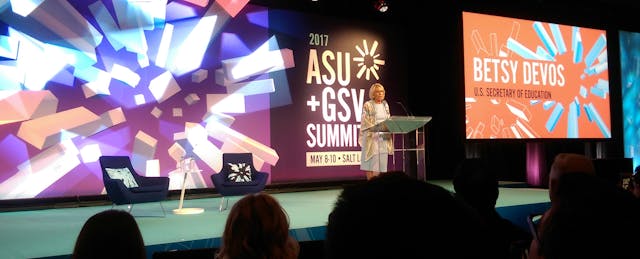“Instead of being called the Department of Education, it should be called the Department of Lifelong Learning, because I think learning has to be for a lifetime.”
That’s the closing comment from the 11th U.S. Secretary of Education, Betsy DeVos, during her 30-minute slot on the main stage at the ASU+GSV Summit today.
DeVos reaffirmed her commitment to “get the federal government out of the way so you can do your job.” She added: “Government alone can’t and shouldn’t solve these problems. The change we need won’t come from Washington.”
As the head and face of the federal education department, DeVos seemed almost hell-bent on doing less. “It’s time for us to break out of the confines of the federal government’s arcane approach to education,” she said bluntly.
Some of her remarks about the “current reality” of the education system took on familiar cliches and tropes. Schools, she says, remain “based on the Prussian model implemented in the early 1800’s.” (That historical comparison is frequently evoked by education reformers, from Khan Academy’s Sal Khan, to the former New York City Schools chancellor, Joel Klein.) DeVos also pointed to the U.S.’s middling performance on the PISA tests as another impetus for change.
DeVos largely stuck to her populist stance about returning power to locality and families to make the education decisions they deem best. “Those who are closest to the problem are those best equipped to solve it,” she said. For DeVos, that means parents should be in the driver’s seat.
“Our education-delivery method should be as diverse as the kids they serve, instead of our habit of forcing them into a one-size-fits-all model,” DeVos stated. She later added: “Traditional, charter, private, virtual, and other delivery methods not yet developed—would all be treated as viable options as long as they meet the needs of students.”
DeVos’ address was a last-minute addition to the conference that did not come without controversy: Her invitation solicited pushback from several presenting companies and event sponsors. Yet the organizers defended the decision, pointing out that other former U.S. education officials, including Arne Duncan and Jim Shelton from the Obama administration, also had speaking gigs.
Addressing a standing-only room largely of entrepreneurs, she posed this challenge: “If you were to start from scratch, what would America’s educational system look like? I doubt you would design a system that focuses on inputs rather than outputs, that prioritizes seat time over mastery, that moves kids through an assembly line without asking whether they’re ready for the next step.”
Starting from scratch appears to be DeVos’ plan. In response to a question from Jeanne Allen, CEO for the Center for Education Reform, during an onstage interview after her brief remarks, about plans for reauthorizing the Higher Education Act, DeVos asked: “Why would we re-authorize an act that is [more than] 50 years old and keeps on getting amended? Why don’t we start afresh?”
That drew some murmurs and questions from the audience. Speaking on a follow-up panel titled “TrumpED: How Will #45 Change the Learning and Work Landscape,” Allison Griffin, Senior Vice President of Government Relations at Strada Education and a former Capitol Hill staffer, said: “You can’t completely wipe the slate clean and start over. But you can think about how can we streamline and simplify.”
To the education technology builders in the room, DeVos offered this nod: “I’m pretty confident that we have not yet realized the full range of technology’s power and ability to help students learn.” She described the education technology industry as a “thousand flowers, and we haven’t planted the whole garden yet.”
DeVos’ abstruse response to a question about what she’s learned drew the most audible snide chuckles. When asked whether she’s learned anything surprising, she offered: “Since I didn’t come into the office with a whole bunch of preconceived ideas...I can’t say there’s really anything that’s surprised me in any major way. On some days it does feel like a game of whack-a-mole.”
Her call to cut red tape was welcomed by some in the audience. “You want the people on the front lines making decisions because they have the best understanding of our students’ needs,” Gabe Nakashima, founder of the Charter Substitute Teacher Network, said after DeVos’ session. “I hope that as a leader she delivers on this promise by best supporting teachers and administrators on the frontlines to give them what they need to do their jobs well.”
Yet others are still waiting on actual plans and policies—beyond simply “letting states be as innovative as they can,” a common refrain used by DeVos to describe the goal of the Every Student Succeeds Act. One attendee, who asked not to be named, bluntly commented: “Deferring responsibility doesn’t seem much of a job.”


